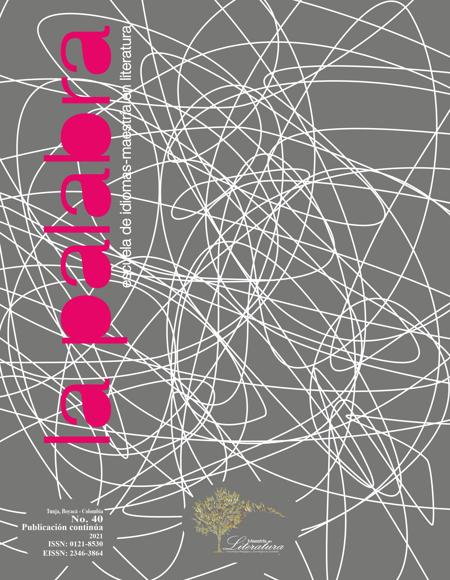Study of the transtextuality in the cinema of Quentin Tarantino

Abstract
Cinema and literature have broad and important practical and theoretical relationships. In relation to the latter, the theory of transtextuality, created by Gérard Genette, has played a fundamental role, due to the vast number of references that have been made to audiovisual or literary works in other films.By virtue of the former, we apply Genette’s types of transtextualities along with the cinematographic notions created by Robert Stam and other theorists based on his postulates to analyze and exemplify some of the most notorious transtextual relationships in Quentin Tarantino’s filmography, currently notorious filmmaker in this field. Therefore, we find that there is a large and special amount of transtextual connections in his films,which is important to demonstrate the relevance of this in his authorship and in the aforementioned relationship between literature and cinema.
Keywords
filmic and cinematographic analysis, Gerard Genette, intertextuality, Quentin Tarantino
References
- Bajtín, Mijaíl. Problemas de la poética de Dostoievski (2.a ed.). México, Fondo de Cultura Económica, 2005.
- Cabrera Infante, Guillermo. Cine o sardina (2.a ed.). Madrid, Editorial Alfaguara, 1997. Coetzee, J. M. Mecanismos internos. Ensayos 2000-2005. Barcelona, Random House Mondadori, 2009.
- Colbert, David. Los mundos mágicos de El señor de los anillos. Barcelona, Ediciones B, 2003.
- Dumont, Gabriel. Beatrix Kiddo en el viejo Oeste. Influencia narrativa, estilística y trans- textual del western en los filmes Kill Bill vol. 1 y Kill Bill vol. 2 (tesis de pregrado, Universidad Central de Venezuela, Caracas), 2017. Recuperado de http://saber.ucv. ve/ handle/10872/20886
- García, Narcisa. Hello, Wall-e: la citación intertextual (tesis de pregrado, Universidad Central de Venezuela, Caracas), 2011.
- Genette, Gerard. Palimpsestos. La literatura en segundo grado. Madrid, Editorial Taurus, 1989.
- Gubern, Román. y Prat, Joan. Las raíces del miedo. Antropología del cine de terror. Barcelona, Tusquets Editores, 1979.
- Kennedy Toole, John. La conjura de los necios (44.a ed.). España, Editorial Anagrama, 2011. Kernan, Alvin. La muerte de la literatura. Caracas, Monte Ávila Editores Latinoamericana,
- Kristeva, Julia. Semiótica I. Madrid, Editorial Fundamentos, 1981.
- Kristeva, Julia. Bajtín, la palabra, el diálogo y la novela. En Navarro, Desiderio (ed.). Inter- textua-lité. Francia en el origen de un término y el desarrollo de un concepto (pp. 1-24). La Habana: UNEAC – Casa de las Américas – Embajada de Francia en Cuba, 1997.
- Leonard, Elmore. Cóctel explosivo. Barcelona, Ediciones B, 1994.
- Milton, John. El paraíso perdido. Barcelona, Editorial Ramón Sopena, 1975.
- Monaco, James. American Film Now. The people, the power, the money, the movies. Nue- va York: The New American Library, 1979.
- Orwell, George. 1984. Bogotá, Editorial Planeta, 2012.
- Posteguillo, Santiago. La sangre de los libros. Barcelona, Editorial Planeta, 2015. Romaguera i Ramió, Alsina Thevenet, eds. Textos y manifiestos del cine. Estética. Escuelas. Movimientos. Disciplinas. Innovaciones. Madrid, Ediciones Cá- tedra, 1993.
- Sábato, Ernesto. El túnel. Barcelona, Editorial Seix Barral, 2007.
- Schwanitz, Dietrich. La cultura. Todo lo que hay que saber. Madrid, Editorial Taurus, 2003. Serrano, Arturo. El cine de Quentin Tarantino. Una aproximación a la estética de la violencia. Caracas, Editorial Publicaciones UCAB, 2014.
- Shelley, Mary. Frankenstein o el moderno Prometeo (2.a ed.). Barcelona, Random House Mondadori, 2011.
- Simsolo, Noël. El cine negro. Madrid, Alianza Editorial, 2009.
- Stam, Robert. Teorías del cine. Barcelona, Ediciones Paidós Ibérica, 2001.
- Stam, Robert, Burgoyne, Robert, y Flitterman-Lewis, Sandy. Nuevos conceptos de la teoría del cine: estructuralismo, semiótica, narratología, psicoanálisis, intertextualidad. Barcelona, Editorial Paidós Ibérica, 1999.
- Steiner, Jean-Françoise. Treblinka. Barcelona, Editorial Plaza & Janes, 1973. Tarantino, Quentin. Malditos bastardos. Barcelona, Random House Mondadori, 2009.
- Villalba, Susana M., y Payán, Juan Miguel. Guía del cine independiente americano de los 90.
- Madrid, Nuer Ediciones, 1996.
- Villalobos Alpízar, Iván. “La noción de intertextualidad en Kristeva y Barthes”. Revista de Filosofía de la Universidad de Costa Rica, 41(103), 2003, págs. 137-146. Web.
- Filmografía
- A prueba de muerte. Dir. Quentin Tarantino. The Weinstein Company, 2007. DVD.
- Perros de reserva. Dir. Quentin Tarantino. Live Entertainment – Dog Eat Dog Productions,
- DVD.
- Pulp Fiction. Dir. Quentin Tarantino. A Band Apart – Jersey Films – Miramax, 1994. DVD.
- Jackie Brown. Dir. Quentin Tarantino. A Band Apart –Miramax, 1997. DVD.
- Kill Bill volumen 1. Dir. Quentin Tarantino. A Band Apart – Miramax, 2003. DVD.
- Kill Bill volumen 2. Dir. Quentin Tarantino. A Band Apart – Miramax, 2004. DVD.
- Bastardos sin gloria. Dir. Quentin Tarantino. Universal Pictures – A Band Apart – The We- instein Company – Visiona Romántica – Zehnte Babelsberg, 2004. DVD.
- Mank. Dir. David Fincher. Netflix, 2020.
- Juego con la muerte. Dir. Robert Clouse. Golden Harvest – Columbia Pictures, 1978. DVD.
- Django. Dir. Sergio Corbucci. B. R. C. Produzione – Tecisa, 1966. DVD.
- Foxy Brown. Dir. Jack Hill. American International Pictures, 1974. DVD.
- Grupo salvaje. Dir. Sam Peckinpah. Seven Arts – Warner Bros, 1969. DVD.
- Cantando bajo la lluvia. Dir Gene Kelly, Stanley Donen. Metro-Goldwyn-Mayer, 1952.
- DVD.
- Las noches rojas de Harlem. Dir. Gordon Parks. Metro-Goldwyn-Meyer, 1971. DVD.
- Los odiosos ocho. Dir. Quentin Tarantino. Double Feature Films – FimColony – The Weins- tein Company, 2015. DVD.
- Había una vez en… Hollywood. Dir. Quentin Tarantino. Columbia Pictures – Heyday Films Bona Film Group, 2019. DVD.
- Django desencadenado. Dir. Quentin Tarantino. A Ban Apart – Columbia Pictures – The
- Weinstein Company, 2012. DVD.
- Creepshow: El festín del terror. Dir. George Romero. Laurel-Show Inc – United Film Distri- bu- tion Compay – Creepshow Films Inc, 1982. DVD.
- Cementerio de mascotas. Dir. Mary Lambert. Paramount Pictures, 1989. DVD.
- Los Simpson. Dir. Matt Groening. Estados Unidos: Gracie Films – 20th Century Fox,
- -presente. DVD.